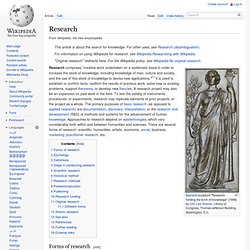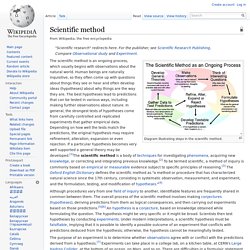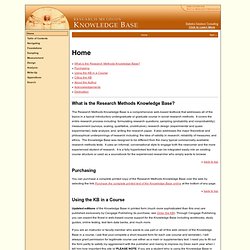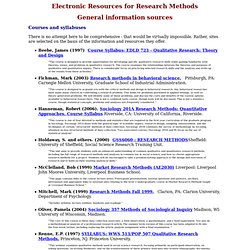

Methods in Behavioral Research. CourseSmart. Cozby-Behavioral Research. Methods in Behavioral Research Information Center: Wikipedia. Research. Basrelief sculpture "Research holding the torch of knowledge" (1896) by Olin Levi Warner.

Library of Congress, Thomas Jefferson Building, Washington, D.C. Forms of research[edit] Scientific research relies on the application of the scientific method, a harnessing of curiosity. This research provides scientific information and theories for the explanation of the nature and the properties of the world. It makes practical applications possible. Research in the humanities involves different methods such as for example hermeneutics and semiotics, and a different, more relativist epistemology.
Artistic research, also seen as 'practice-based research', can take form when creative works are considered both the research and the object of research itself. Etymology[edit] Definitions[edit] Research has been defined in a number of different ways. Steps in conducting research[edit] Rudolph Rummel says, "... no researcher should accept any one or two tests as definitive. Critical thinking. Critical thinking is a type of clear, reasoned thinking.

According to Beyer (1995) Critical thinking means making clear, reasoned judgements. While in the process of critical thinking, ideas should be reasoned and well thought out/judged.[1] The National Council for Excellence in Critical Thinking defines critical thinking as the intellectually disciplined process of actively and skillfully conceptualizing, applying, analyzing, synthesizing, and/or evaluating information gathered from, or generated by, observation, experience, reflection, reasoning, or communication, as a guide to belief and action.'[2] Etymology[edit] In the term critical thinking, the word critical, (Grk. κριτικός = kritikos = "critic") derives from the word critic, and identifies the intellectual capacity and the means "of judging", "of judgement", "for judging", and of being "able to discern".[3] Definitions[edit] According to the field of inquiry [weasel words], critical thinking is defined as: Skills[edit] In sum:
Scientific Method. Diagram illustrating steps in the scientific method.

The scientific method is an ongoing process, which usually begins with observations about the natural world. Human beings are naturally inquisitive, so they often come up with questions about things they see or hear and often develop ideas (hypotheses) about why things are the way they are. The best hypotheses lead to predictions that can be tested in various ways, including making further observations about nature. In general, the strongest tests of hypotheses come from carefully controlled and replicated experiments that gather empirical data. Depending on how well the tests match the predictions, the original hypothesis may require refinement, alteration, expansion or even rejection.
Although procedures vary from one field of inquiry to another, identifiable features are frequently shared in common between them. Tutorials : Sage Research Methods Online. Research Methods in Psychology. Multimedia Educational Resource for Learning and Online Teaching. Research Methods in Psychology. RM Knowledge Base. HomeNext » What is the Research Methods Knowledge Base?

The Research Methods Knowledge Base is a comprehensive web-based textbook that addresses all of the topics in a typical introductory undergraduate or graduate course in social research methods. It covers the entire research process including: formulating research questions; sampling (probability and nonprobability); measurement (surveys, scaling, qualitative, unobtrusive); research design (experimental and quasi-experimental); data analysis; and, writing the research paper. It also addresses the major theoretical and philosophical underpinnings of research including: the idea of validity in research; reliability of measures; and ethics.
The Knowledge Base was designed to be different from the many typical commercially-available research methods texts. » back to top Purchasing Using the KB in a Course Request Permission to Use KB in a Course Thanks for your help on this. About the Author William M.K. Electronic Resources for Research Methods - courses, syllabuses. There is no attempt here to be comprehensive - that would be virtually impossible.

Rather, sites are selected on the basis of the information and resources they offer. Beebe, James (1997) Course Syllabus: EDLD 723 - Qualitative Research: Theory and Design "This course is designed to provide opportunities for developing specific qualitative research skills while gaining familiarity with theories, issues, and problems in qualitative research. The course examines the relationships between the theories and purposes of qualitative and quantitative inquiry. There is considerable focus on practicing selected research skills and the analysis and write-up of the results from these activities. " Fichman, Mark (2003) Research methods in behavioral science. Search Google for more sites.